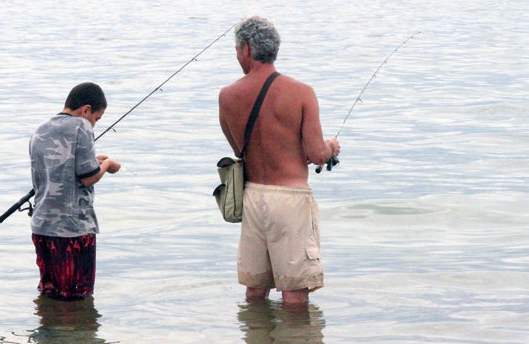Parenting Teens - Boundaries
Parenting Teens - Boundaries
While the teenage years can at times be stormy and emotional, your kids need to know that you will always be there and what you expect from them.
Key points about teenagers and boundaries
- be the rock for your kids – set limits, act like adults, be there for them – no matter what
- don't let their problem become your problem
- cool off when you need to
How can I be a 'rock' for my teen?
While the teenage years can at times be stormy and emotional, your kids need to know that you will always be there and what you expect from them. Despite what teens might say, most just want you to be their 'rock' …. by setting limits, acting like adults and being there for them – no matter what.

How can rules help my teen?
Teens also need to have enough space to make decisions and take responsibility for their actions.
It's part of being a teenager to push against the boundaries, to test the rules. However, if there are no boundaries and no rules then they have no guide to know when to stop, when it is enough, or even to understand that what they are doing is simply wrong. Teens also need to have enough space to make decisions and take responsibility for their actions. Your rules should be not too loose – and not too tight.
"We made it clear to Ryan when he was 14 that he needed to come home on his nights out by 10pm. We agreed that when he turned 16, midnight would be OK and we stuck to that. He wasn’t always happy – but he was always home on time".
How can I explain consequences to my teen?
Kia marino – let there be calm. Stop the urge to shout or say something nasty.
If you want to change your teens' behaviour, you need to make the problem theirs – not yours.
Try not to get upset or angry when your teenager doesn't follow your rules. Instead – point out the consequences you have agreed ahead of time.
"Jessica started coming in later than our agreed time from parties. We'd argue and I'd get mad. We'd both shout and swear and usually end up in tears. Then, I stopped arguing with her – and made it clear that if she didn't come home on time – she'd have to stay home the following weekend. She spent a couple of weekends at home before it sunk in. But we got there in the end. You just have to stick at it – and not take it personally."
Kia Marino – Let there be calm. Stop the urge to shout or say something nasty.
What should I do if I'm getting angry with my teen?
Getting angry? Going to lose it? Walk away.
It's easy to tell when things are out of control. The volume switch is up – and the talking has become shouting. Now is the time to stop – cool off – and agree a time to talk later when you are all in a better state.
Haere – Go. Getting angry? Going to lose it? Walk away.
Whiriwhiria – Negotiate. Help them weigh their behaviour.
What are some steps for setting better rules for my teen?
When you talk with your kids about setting rules or limits – there are 4 things that can make the discussion easier.
"I'm on your side….."
Always begin with love (aroha).
Let your kids know that you care about what happens to them and that you have their best interests at heart – for their own good.
Setting limits can sometimes cause conflict between you and your kids. They may get mad, or feel victimised. They might want to resist your rules because they seem harsh and uncaring. Expressing your love will help your teen to hear what you are saying, accept the rules and understand the results if they break them.
Showing your love
Try saying things like:
- "I'm doing this because I love you and I care what happens to you", or
- "I just want you to do the best that you can."
"I have some rules I want you to follow…"
Young people need you to give them guidance and to set rules and limits around a wide range of activities, including alcohol use. These are the dos and don'ts that let your kids know what you expect of them. They tell your kids where the line is – so they can choose whether or not to cross it. These limits need to be clear and understood, so that your kids are left in no doubt if they have gone too far.
Teenagers who have reasonable expectations for how they should act tend to do better in life, because rules are part of life.
Setting rules tells your kids you care about them.
Rules
Make as few as possible – 3 to 5 should be enough. More than 5 and it becomes difficult to remember them all and make them work.
Make them realistic.
Keep them simple and fair.
Negotiate the details – teenagers need to see what's in it for them before they'll consider making a compromise.
Revisit the rules from time to time. As changes happen for your kids, the rules you set for them should take this into account.
"You can choose to accept or reject the rules."
To be real, you can't always make your kids make the right choice. It's hard to be in total control of what they do, especially outside of the home. So in order for kids to learn to make good choices, they also need to be able to make bad ones and know what happens when they stuff up.
Learning from our mistakes – or from making poor choices – is how we learn to better cope in life. This can be frustrating and even painful for us as parents or caregivers, but it also means that when our kids learn from their mistakes – they will be better for it.
"Here's what will happen….."
Unuhia te taonga – take away a privilege.
Teenagers need to understand that all of their actions have consequences. If they do good things – they'll be better off and maybe get a reward. If they break the rules, there will be a consequence. You need to be clear to them what will happen if they choose to cross the line. And if they do – you MUST follow through with that consequence.
"We told Ashley that we wanted her to wait until she was 18 before she could drink alcohol at the parties she was going to. We made it clear that she wouldn't be able to use the internet or watch TV for a month if she did."
Mutunga – consequences. Unuhia te taonga – take away a privilege.
See more KidsHealth content on parenting teens
This page last reviewed 12 March 2024.
Do you have any feedback for KidsHealth?
If you have any feedback about the KidsHealth website, or have a suggestion for new content, please get in touch with us.
Email us now

